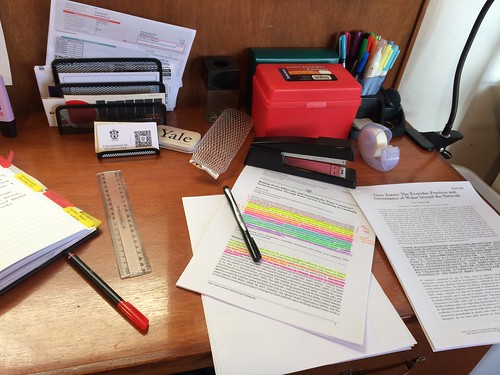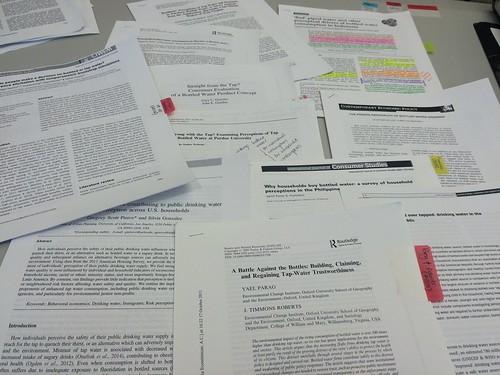“You need to stay on top of the literature”
This is such a common trope in academic life (just look at this Twitter search I did). I have uttered more times than I want to admit. It’s important to note that just about everyone who does scholarly work feels the same. It’s absurdly difficult to stay on top of the literature. Thousands of papers are published EVERY DAY, and no, nobody is actually reading them (just look at the absurdly high number of articles published on the COVID19 global pandemic!).
Let’s start with stating the obvious:
– There is an absolutely unmanageable influx of published work that would necessitate that we devote our lives to reading to even barely make it to “stay on top of the literature”
– There are too many competing demands for our time.
– Increased care work has meant that women have been disproportionately (NEGATIVELY) affected by this global pandemic.
– For some bizarre reason, some people seem to be operating on the assumption that life is normal when it’s not, so workloads have increased, support has not.
– TIME IS NOT MALLEABLE. There are 24 hours in the day of which at least 7 woudl need to be dedicated to sleep (and for mothers, particularly of young children, this is absolutely impossible to do, sleep well). Parenting is very hard, single-parenting is super hard. + Academia!
– Being healthy is extremely important. At the same time, academia is ableist from its design. For those of us who have dealt with chronic pain, chronic fatigue, and other illnesses (including mental), it’s challenging to juggle everything and maintain a semblance of a life.
We don’t just “do stuff”. We need to think, reflect, connect ideas, read AND write. To do that, you need to have some semblance of healthy body and mind, and it is VERY challenging to manage illnesses, life AND deal with the increasingly overwhelming multiple demands.
Ok, all of the above stated, I do believe that there are a couple of strategies that we can use to “catching up with the literature”. Again, I’m going to state the obvious: THERE IS NO HUMANLY POSSIBLE WAY TO STAY ON TOP OF THE LITERATURE. There are ways, to “catch up” with it. remember loving my doctoral comprehensive exams because I was going to be able to READ and annotate, and take notes, and synthesize, etc. I was given a TASK (survey and master the literature) and a TIME ALLOCATION (1-2 years in most Canadian doctoral programmes).
Ok, so given that time is not malleable, and competing tasks are demanding our time, what can we do to catch up with the literature? Here are a few that I’ve used, even at my most ill. The key issue to remember here for me is: your (my) well being should be top priority.
CHANGING OUR MINDSET: DON’T TRY STAY ON TOP OF THE LITERATURE. INSTEAD, CATCH UP WITH THE LITERATURE.
Thinking of it as “catching up” instead of staying on top is crucial for me. I no longer aspire to be THE GO-TO-GUY FOR LITERATURE ON X (I used to be This Guy when I was in graduate school, by the way). I’ve lowered my expectations of myself, and the demands I impose on myself. Now, on to the strategies.
1. The “One Paper a Day” #AICCSED Strategy
I thrive on routine, and there’s something magical for me about having a printed paper and highlighting it and annotating it. But I know I have a metric tonne of things to do, so I try to JUST read ONE paper per day, and even then…
This routine (print paper, read, highlight, annotate, dump notes into a Conceptual Synthesis Excel Dump (CSED) row) is something I’ve grown to do within a reasonable amount of time (30 minutes) https://t.co/LuNbAcwzhX
This routine is what I call #AICCSED Processing.
— Dr Raul Pacheco-Vega (@raulpacheco) February 25, 2021
Obviously, the #AICCSED acronym stems from combining both techniques’ acronyms: AIC from the reading strategy and CSED from the systematizing strategy). Doing a daily #AICCSED helps me add notes and absorb material regularly without stressing about being “on top of the literature” (I will never be, I’ve accepted this).
Remember: READING IS WRITING. https://t.co/lQSxjOEV5G
Sustaining a writing practice necessitates building a reading practice. Yes, those 30 minutes you spend reading an article may not look to you as “writing”, but they ARE helping you (me!) generate and connect ideas.
— Dr Raul Pacheco-Vega (@raulpacheco) February 25, 2021
2. The “Reading Fridays” Batch Processing #AICCSED strategy.
This was hard to do, and I know I’m privileged in being able to do this. Last semester, while teaching 4 courses, my Fridays were absolutely exhausting. So this semester I have turned Fridays into READING DAYS. It is definitely stressful because I know I NEED to do A LOT of things at the same time. But if I am going to try to catch up with the literature, I put all my reading on one day: theses drafts, papers to grade, journal article reviews, etc. ALL THE READING GETS DONE ON A FRIDAY.
You are going to ask this question, so it’s better if we get it out of the way:
How do I decide what I can get away with? (that is, when do I know a paper should be read more in depth and therefore I need to allocate more time to read it?
The answer to this question necessitates that you develop a HEURISTICS OF TRIAGE.
In a way, we are all triaging every day. With competing demands on our time, and trying to juggle way too many tasks, we need to tend to issues that need our attention more (or, as the medical origing of triaging means, the patients that need the most help at the moment).
TO NOTE: I don’t think we should JUST skim articles, book chapters and books. There’s always the need for a Second Round of In-Depth Reading https://t.co/eRK7SVgEqH
But that time allocation decision is internal to you, not external. Only you can decide if you need a second round
— Dr Raul Pacheco-Vega (@raulpacheco) February 25, 2021
3. The “Per-Project” Batch #AICCSED Processing.
In addition to A-Day-A-Week-For-Reading Batch #AICCSED Processing and Daily #AICCSED Processing, I sometimes apply this strategy, but on a per-project basis. Usually when I am doing something new, or when I am meeting with a coauthor. I process readings the day before our meeting, so I can be prepared.
Doing Per-Project Batch #AICCSED Processing makes something easier for me: I don’t jump across literatures that often. For example, this week I am collaborating with a colleague on a grant proposal. I’m reading on subnational politics, that’s going to be my batch for this week.
IN CONCLUSION…
I think “staying on top of the literature” is unrealistic and damaging to our soul. I believe in a more humane, focused, realistic, health-minding approach to absorbing scholarly materials, a strategy where we “catch up with the literature” instead of trying, unsuccessfully and frustratingly, seeing how the pile of “To-Be-Read-Whenever-I-Find-A-Minute” materials grows. Hopefully these strategies will make sense to you all, and more importantly, I hope they’re helpful!





0 Responses
Stay in touch with the conversation, subscribe to the RSS feed for comments on this post.